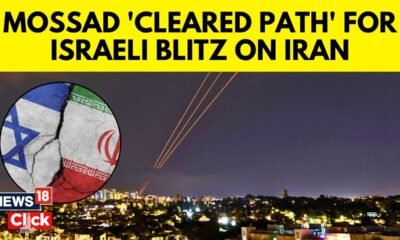A Middle Eastern Powder Keg: Iran’s Retaliation and the Perilous Path Ahead
The Middle East is once again embroiled in a crisis of immense proportions, a dangerous escalation fueled by a cycle of attack and retaliation. The recent events have the potential to ignite a wider conflict, dramatically impacting global stability and energy markets. This post will delve into the intricacies of this volatile situation, examining the key players and the potential consequences.
The Ignition Point: US Strikes on Iranian Nuclear Facilities
The current turmoil began with US airstrikes targeting Iranian nuclear enrichment sites. Under President Trump’s administration, these attacks were justified as necessary to cripple Iran’s nuclear program, with claims of complete facility destruction. However, the true extent of the damage remains shrouded in uncertainty. Regardless of the precise impact, the action was undeniably provocative, significantly escalating pre-existing tensions and pushing the two nations closer to open warfare. The audacity of the strike served as a clear signal of the US’s intent and its willingness to take decisive, even aggressive, action.
A Provocative Act with Unclear Consequences
The ambiguity surrounding the effectiveness of the strikes only heightened the already volatile situation. The lack of transparency concerning the damage inflicted fueled speculation and further inflamed tensions, making any diplomatic solution far more difficult to achieve. The inherent uncertainty surrounding the situation, coupled with the already tense relations between the two countries, set the stage for a dramatic escalation of events.
Iran’s Response: A Cascade of Retaliation and Threats
Iran’s response was immediate and forceful. Foreign Minister Javad Zarif issued a dire warning of “lasting consequences” for what he termed “outrageous” strikes. Simultaneously, the Islamic Revolutionary Guard Corps (IRGC), Iran’s elite military force, declared US bases and personnel within the region to be vulnerable targets. This harsh rhetoric was not merely posturing; it was accompanied by concrete action.
Missile Strikes on Israel: A Calculated Response
A significant barrage of Iranian missiles targeted Israel, causing damage to civilian infrastructure in major cities such as Tel Aviv, Jerusalem, and Haifa, resulting in injuries to approximately 80 individuals. It’s crucial to note that this retaliatory action came ten days after Israel had initiated its own attacks on Iranian nuclear facilities, highlighting the cyclical nature of escalation and the precarious balance of power in the region.
The Strait of Hormuz: A Geopolitical Chokepoint
Further compounding the crisis, Iran’s parliament considered the closure of the Strait of Hormuz, a vital waterway accounting for a substantial portion of global oil transport. This move, though not yet implemented, possesses immense geopolitical significance. The mere threat of closure underscores Iran’s resolve to exert pressure and retaliate against perceived US aggression, and it carries the potential to trigger a severe global energy crisis, leading to a sharp increase in oil prices and widespread economic instability.
Trump’s Defiance: A Path to Further Escalation?
President Trump’s response further escalated tensions. He doubled down on his assertion of the US strikes’ success and issued an ultimatum to Tehran: capitulate or face even more devastating attacks. This uncompromising stance leaves little room for diplomatic solutions, significantly increasing the likelihood of further conflict and hindering any attempts at de-escalation.
A Brinkmanship Game with Devastating Potential
The current situation represents a deeply dangerous game of brinkmanship. Both sides have demonstrated a willingness to escalate, fueling concerns of a broader regional conflict with potentially catastrophic consequences. The looming threat to global oil supplies adds another layer of complexity, with profound economic implications. The international community faces a critical challenge: to de-escalate tensions and navigate a path toward peaceful resolution before the situation spirals entirely out of control.
Conclusion: A Critical Juncture
The events unfolding in the Middle East are deeply unsettling. The US strikes, Iran’s forceful response, and the escalating rhetoric have brought the region to the precipice of a potentially devastating conflict. Urgent international intervention is needed to de-escalate the situation and find a diplomatic solution before the consequences become irreversible. The stakes are incredibly high, and the cost of failure is unthinkable.










![[VDO] What evidence does Thailand have to claim Tamoan Thom Temple as its own? 9 What evidence does Thailand have to claim Tamoan Thom Temple as its own](https://hothotnews.com/wp-content/uploads/2025/06/What-evidence-does-Thailand-have-to-claim-Tamoan-Thom-Temple-as-its-own-e1751463052220.jpg)


